Daily Vocabulary Words: Enhance Your Lexicon with Leading Newspapers & Publications
Welcome to the Daily Vocabulary section at Wordpandit!
Our mission is straightforward: to bring you essential vocabulary words featured in top newspapers and publications worldwide. By focusing on words you’ll encounter in renowned sources, we aim to help you enhance your vocabulary effectively and practically.
Our selection includes words from:
– The New York Times
– The Washington Post
– Scientific American
– BBC
– The Guardian
– Psychology Today
– Wall Street Journal
– The Economist
– The Hindu
– The Times of India
– The Economic Times
– Hindustan Times
– Live Mint
– The Indian Express
– And many more.
We are committed to your vocabulary development. Simply visit this section regularly and explore the daily posts. This is your go-to repository for commonly used words, providing significant practical benefits by familiarizing you with vocabulary from the leading publications listed above.
Make it a habit to visit our website daily and expand your lexicon with words from top newspapers and publications. (edited)
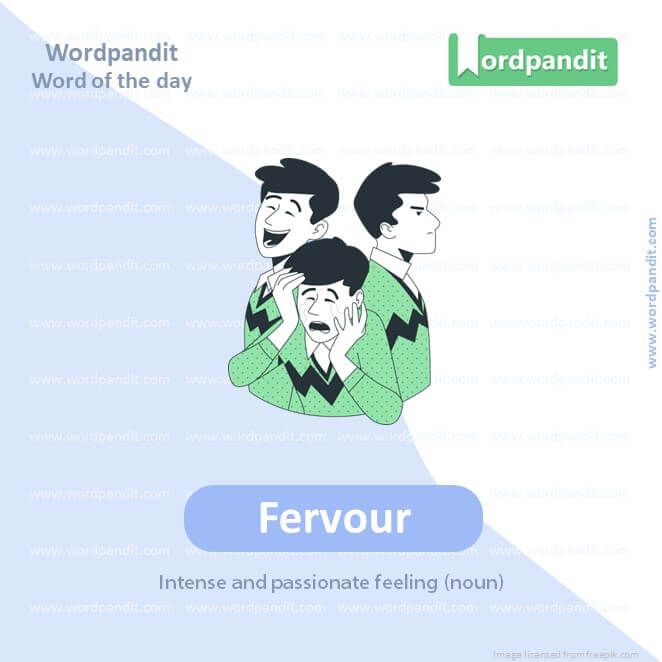
WORD-1: Fervour
CONTEXT: But that fervour seems to have been missing for Bitcoin in particular and crypto in general during 2023.
SOURCE: Live Mint
EXPLANATORY PARAGRAPH: Imagine when you get really excited about your favorite ice cream or a new toy, and you can’t stop smiling and talking about it. That super happy and excited feeling is called “fervour.” It’s like having a lot of energy and passion for something you really like.
MEANING: Intense and passionate feeling (noun).
PRONUNCIATION: FUR-vur
SYNONYMS: Enthusiasm, passion, zeal, eagerness, intensity, excitement, ardor
USAGE EXAMPLES:
1. She spoke with great fervour about her love for animals.
2. The fans cheered with fervour at the concert.
3. His fervour for painting is evident in his beautiful artwork.
4. The teacher’s fervour for teaching made the class very interesting.
WORD-2: Derivatives
CONTEXT: Third, typically when retail investors invest in an asset class once it has rallied substantially, the fear of missing out (FOMO) dynamic is at work. In the Indian case, the FOMO trade has moved to small-cap stocks and financial derivatives this time round.
SOURCE: Live Mint
EXPLANATORY PARAGRAPH: Think of a derivative like making a yummy smoothie from your favorite fruits. You take pieces from different fruits to create something new. In the same way, derivatives are things that come from other things, like making new words from old words or creating new ideas from old ideas.
MEANING: Something that is based on another source (noun).
PRONUNCIATION: dih-RIV-uh-tivs
SYNONYMS: Offshoots, by-products, spin-offs, variations, adaptations, outcomes, extensions
USAGE EXAMPLES:
1. The word “happiness” is a derivative of “happy.”
2. Many medicines are derivatives of natural substances found in plants.
3. His painting style is a derivative of his mentor’s techniques.
4. Financial derivatives can be complex to understand.
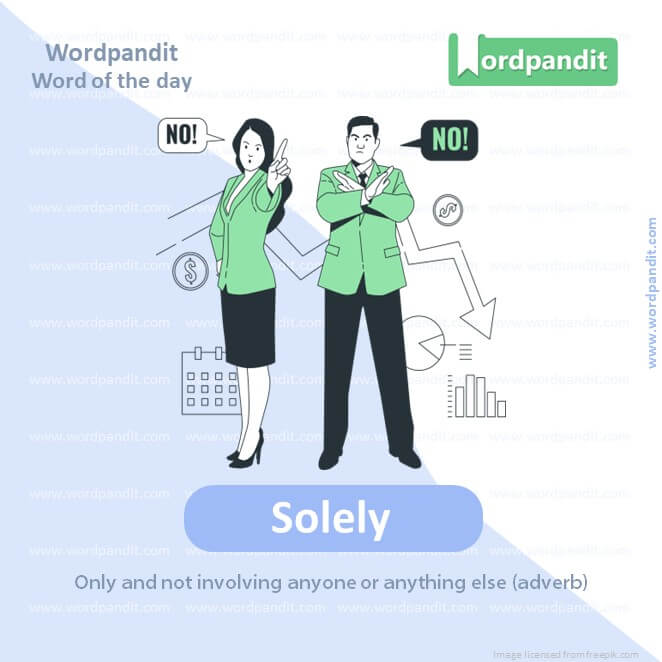
WORD-3: Solely
CONTEXT: Fifth, despite all the talk around the use cases of crypto, nothing substantial came out of it, and it turned out to be “an asset whose value derives solely from greater fools” pricing it “as high as the last idiot willing to buy it.” Of course, some greater fools continue to be around.
SOURCE: Live Mint
EXPLANATORY PARAGRAPH: Imagine you have a toy that is just for you and no one else can play with it. That means the toy is “solely” yours. “Solely” means something belongs to one person or one thing only, not shared with others.
MEANING: Only and not involving anyone or anything else (adverb)
PRONUNCIATION: SOLE-lee
SYNONYMS: Only, exclusively, purely, entirely, just, simply, alone
USAGE EXAMPLES:
1. She was solely responsible for the project.
2. The decision was made solely by the manager.
3. He relied solely on his own skills to complete the task.
4. This room is solely for guests.
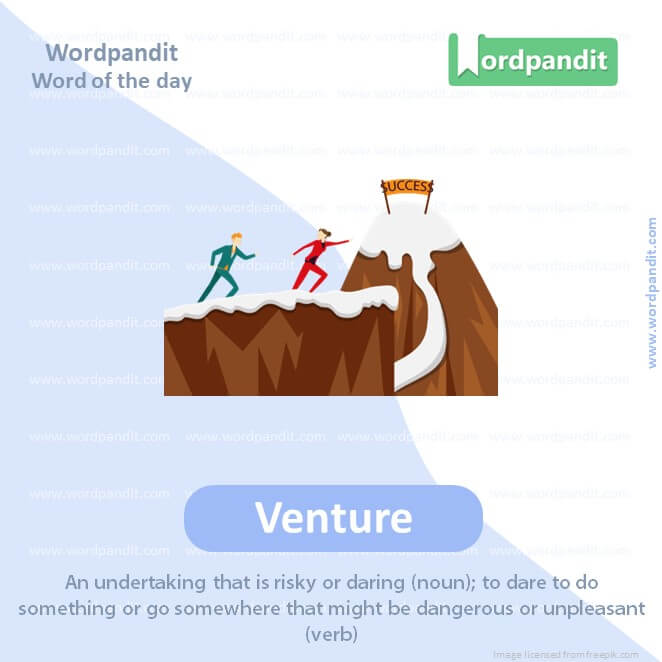
WORD-4: Venture
CONTEXT: So, there is no real communication happening from the industry to egg on another round of greater fools, possibly because venture capitalist money that funded the industry might be running out or the industry might be playing it safe, given the government crackdown on its unregulated nature, including in China and India.
SOURCE: Live Mint
EXPLANATORY PARAGRAPH: Imagine going on an adventure to a new place where you’ve never been before. A “venture” is like an adventure where you try something new, even if you’re not sure what will happen. It’s about being brave and exploring.
MEANING: An undertaking that is risky or daring (noun); to dare to do
something or go somewhere that might be dangerous or (verb)
PRONUNCIATION: VEN-chur
SYNONYMS: Endeavor, undertaking, enterprise, adventure, expedition, quest
USAGE EXAMPLES:
1. The explorers set off on a venture to discover new lands.
2. Starting a new business can be a risky venture.
3. He decided to venture into the forest despite the warnings.
4. They ventured out into the storm to rescue the stranded hikers.
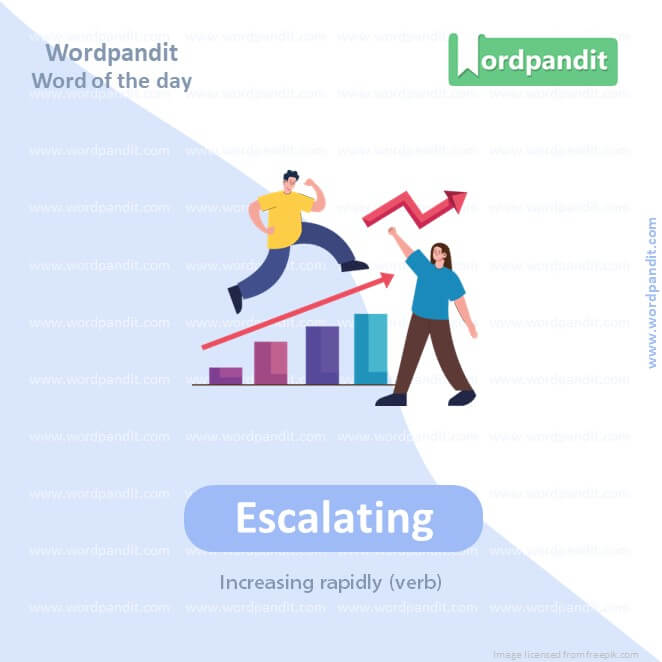
WORD-5: Escalating
CONTEXT: The rapidly escalating debt crisis in the Global South, while not a direct focus of the conference, cast a shadow over it.
SOURCE: Live Mint
EXPLANATORY PARAGRAPH: Imagine you’re building a tower with blocks, and you keep adding more and more blocks, making it taller and taller. When something keeps growing or getting bigger, we say it is “escalating.” It means going up or increasing.
MEANING: Increasing rapidly (verb).
PRONUNCIATION: ES-kuh-lay-ting
SYNONYMS: Increasing, intensifying, rising, growing, mounting, surging, expanding
USAGE EXAMPLES:
1. The conflict between the two countries is escalating.
2. Prices have been escalating due to high demand.
3. The situation in the room escalated quickly after the argument started.
4. They are taking steps to prevent the problem from escalating.
WORD-6: Unipolar
CONTEXT: Others focused on the changing nature of globalization, the shift from a unipolar to a multipolar economic order, and the erosion of democratic institutions amid the rise of populist nationalism.
SOURCE: Live Mint
EXPLANATORY PARAGRAPH: Think of a unipolar world like having just one superhero who looks after the whole city. “Unipolar” means there is only one main leader or power in a particular area.
MEANING: Dominated by a single power or pole (adjective).
PRONUNCIATION: YOO-nee-poh-lar
SYNONYMS: Single, singular, solo, one-sided, lone, solitary, exclusive
USAGE EXAMPLES:
1. The world has become more unipolar with the rise of a single superpower.
2. Unipolar depression focuses on mood changes in one direction.
3. The unipolar design of the motor makes it easier to control.
4. A unipolar moment in history often leads to significant changes.
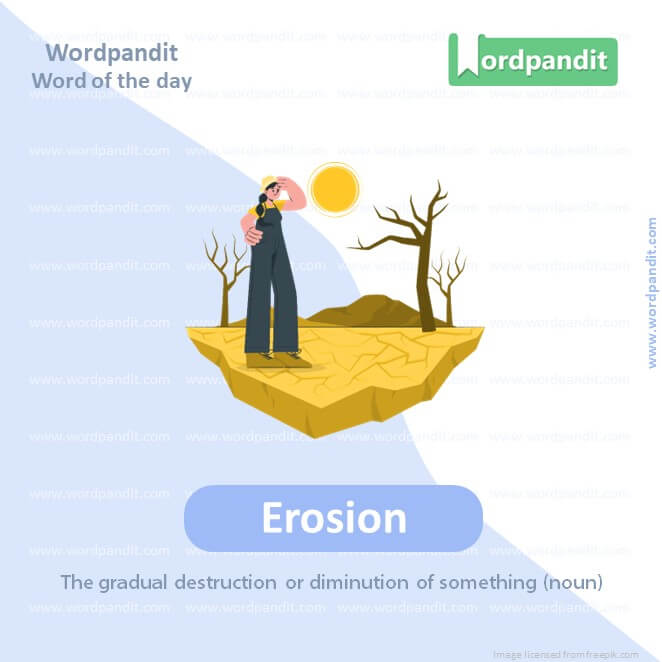
WORD-7: Erosion
CONTEXT: Others focused on the changing nature of globalization, the shift from a unipolar to a multipolar economic order, and the erosion of democratic institutions amid the rise of populist nationalism.
SOURCE: Live Mint
EXPLANATORY PARAGRAPH: Imagine building a sandcastle at the beach, and then the waves come and slowly wash it away. “Erosion” is when things like wind or water wear away rocks, soil, or other materials over time.
MEANING: The process of being gradually worn away by natural forces (noun).
PRONUNCIATION: ee-ROH-zhun
SYNONYMS: Wearing away, deterioration, abrasion, depletion, weathering, corrosion, decay
USAGE EXAMPLES:
1. The constant waves caused the erosion of the shoreline.
2. Erosion has shaped many of the world’s landscapes.
3. The erosion of trust between the two friends was hard to repair.
4. Measures were taken to prevent soil erosion on the farm.
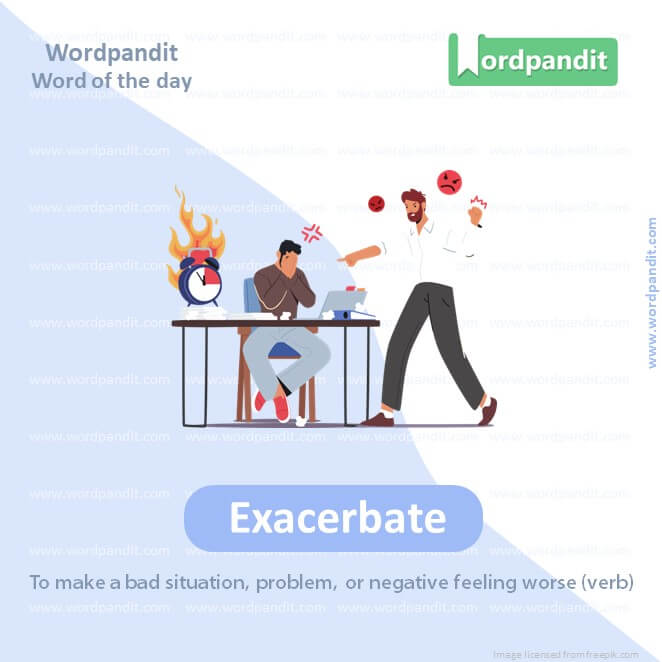
WORD-8: Exacerbate
CONTEXT: Disillusioned Western voters’ tendency to favour right-wing leaders is puzzling, however, given that these politicians’ favoured policies will likely exacerbate the problems they purport to address.
SOURCE: Live Mint
EXPLANATORY PARAGRAPH: Imagine you have a small cut, and then you scratch it, making it worse and more painful. To “exacerbate” means to make something that’s already bad even worse.
MEANING: To make situation, problem. or negative feeling worse (verb)
PRONUNCIATION: ig-ZAS-er-bayt
SYNONYMS: Worsen, aggravate, intensify, amplify, escalate, heighten, increase
USAGE EXAMPLES:
1. His rude comments only exacerbated the tension between them.
2. The cold weather exacerbated her arthritis pain.
3. Not getting enough sleep can exacerbate health issues.
4. The new policies may exacerbate the problem of homelessness.
WORD-9: Granular
CONTEXT: A more granular analysis yields a bleaker picture of the world’s economic landscape.
SOURCE: Live Mint
EXPLANATORY PARAGRAPH: Imagine playing with sand, which is made up of tiny grains. “Granular” means something is made up of small, grain-like pieces or details, just like the sand.
MEANING: Consisting of small grains or particles (adjective).
PRONUNCIATION: GRAN-yoo-lar
SYNONYMS: Grainy, gritty, particulate, coarse, detailed, textured, pebbly
USAGE EXAMPLES:
1. The beach has a granular texture because of the fine sand.
2. They need granular data to make an accurate analysis.
3. The cereal has a granular consistency.
4. The report provided a granular breakdown of the expenses.
WORD-10: Bleaker
CONTEXT: A more granular analysis yields a bleaker picture of the world’s economic landscape.
SOURCE: Live Mint
EXPLANATORY PARAGRAPH: Imagine a rainy day where everything looks gray and sad, and there’s no sunshine. “Bleaker” means something looks sadder, gloomier, or less hopeful than before.
MEANING: Lacking in cheer, brightness, or hope; more depressing (adjective).
PRONUNCIATION: BLEE-ker
SYNONYMS: Gloomier, drearier, darker, more depressing, more dismal, more somber, more hopeless
USAGE EXAMPLES:
1. The weather forecast looks bleaker for the weekend.
2. After the news, their mood became even bleaker.
3. The future seemed bleaker after the recent setbacks.
4. His outlook on life grew bleaker over time.
Vocabulary Words
When delving into the dynamic world of languages, the grandeur of ‘vocabulary words’ is all-encompassing. The importance of ‘vocabulary words’ in effective communication cannot be overstated; it’s these words that form the backdrop of any language, painting intricate pictures of thoughts and ideas.
Starting on the journey of learning ‘vocabulary words’, one should steer clear from rote memorization. The traditional structure of merely repeating words lacks the necessary context and application that actually embeds these words into your memory. To truly master the ‘vocabulary words’, one needs an integrated, immersive approach.
The first step towards mastering ‘vocabulary words’ is to engage with varied language mediums. Expanding beyond textbooks to read fiction, articles, blogs, and other forms of content not only diversifies your vocabulary but also acts as a mirror to reflect the practical application of these words. Essentially, you’re exposed to the words as they are commonly used, allowing you to truly understand their essence.
Empowering this journey, tech tools like language learning apps and memory-enhancing flashcards significantly aid in learning ‘vocabulary words’. These interactive tools provide a more engaging learning experience and hone word retention. Mnemonic devices, associating words with a unique story or visual image, enrich the process and make memory recall more efficient.
Practicing ‘vocabulary words’ by using them in day-to-day conversations exemplifies learning by doing. It also strengthens the neural pathways and improves overall word recall. This, coupled with regular revisions, ensures your grasp over ‘vocabulary words’ remains strong.
In conclusion, learning ‘vocabulary words’ is not just about adding words to your linguistic cupboard, but understanding their essence and utilizing them effectively. An inclusive approach to learning that combines diverse reading materials, technology tools, mnemonic devices and practice can really propel your mastery over ‘vocabulary words’. Remember, language is the bloodline of communication, and ‘vocabulary words’ are its heartbeat. ‘













